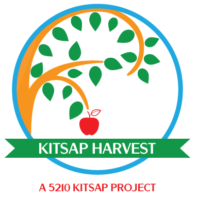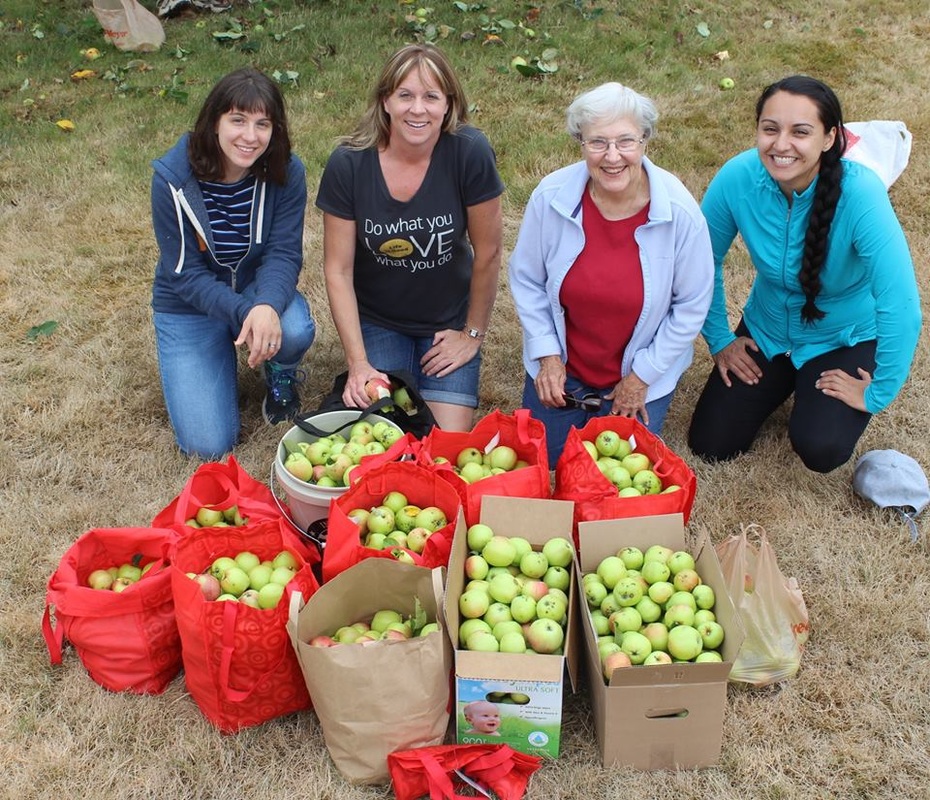Food Bank Gardens
Kitsap County is lucky to have three food banks which sustain gardens: Bremerton Foodline, North Kitsap Fishline, and South Kitsap Helpline. Purchased in 2010, Helpline enjoys a particularly voluptuous nursery and is run by Master Gardeners, staff, and volunteers. A portion of the produce and veggie starts grown in the greenhouse are for sale to create revenue while the rest provide aid to other local food banks and non-profit gardens. However, the majority goes straight to Helpline clients. They grow a variety of fresh produce, starts, herbs, and flowers, and encourage people to drop by. On a wider scale, Helpline Nursey is linked with the Fred Meyers rewards program in order to broaden the message. Click here to link your account and benefit the food bank.
Last summer I represented Kitsap Harvest at a garden planning committee meeting at North Kitsap Fishline. The garden consists of several beds sloping up toward the hill behind the building. The beds are carefully marked off in one foot increments and signs are rooted next to plants with the names of vegetables or the volunteer in charge of the plot. Meeting attendees included the food bank manager, clients, and volunteers. That morning the agenda centered on systems planning and discussion grew around schedule and feasibility: work dates, water timers, grant requests, and website maintenance. The best part of the meeting was a girl in middle school who had come to talk about her project she called Generation Grow. The project donates raised beds and other supplies to non-profit gardens. Although it didn’t come to fruition, it was inspiring to see a young person invested in the idea of healthy food access. Although current gardens supplement today, extending that knowledge to future generations is beneficial for years to come.
A successful food bank garden:
-
Is managed by a Master Gardener, horticulture specialist, or a team with green thumbs
-
Grows produce which appeals to clients
-
Provides resources such as recipes and nutrition information
-
Empowers and educate clients and volunteers about the process of growing your own food
Community GardenRecovery
Community gardens occupy a wonderful space from which to glean. So much more than simply growing food, they are a haven of education for all ages and complement the old tradition of providing for yourself. Kitsap Harvest has taken on the task of supporting a community garden in the heart of Bremerton consisting of 16 beds each 6 feet square. Funded by Seeds of Grace, the garden will grow food to increase local food security beginning in spring 2017. In seasons past the garden has grown many kinds of vegetables with large success in spinach, kale, and chard. Lately it could use a little assistance, and that’s just what Kitsap Harvest aims to accomplish.
Named the Victory Garden, this space will fulfill its namesake by growing food that stays local. Inspired by the old adage of teaching rather than giving, the garden will also provide interpretive signs displaying what is growing and how to use it. The larger picture emphasizes the importance of sustainability by utilizing rain water management and native pollinator attraction. The full image depicts a lush space with healthy vegetables donated to food banks, flowering native plants, and a design based on permaculture. This project is still in the works and below is the progress so far.
Diary of a Non-Gardener
As I begin to think about creating a community garden as multi-faceted as I dream for it to be, many obstacles and resources come into play. First, it had to sink in that I was officially in charge of a garden because I'm not a naturally-gifted gardener. Exposed to gardening at a young age with my parents, I witnessed the toil of nurturing, the exhaustion of the maintenance, and the thrill of the harvest. I’m eager for a chance to rediscover these simple pleasures. This is the first garden I’m in charge of planning, but I have multiple resources and skilled individuals at my disposal. The trend in my life these days is to say yes and dive in.
Seeds of Grace is a local organization with the mission to provide Bremerton and areas worldwide with gardens to feed locals. They provide support through funding and connect the gardens with community leaders who manage them. When we first agreed to manage the space, I expected to see the three beds I’d weeded last summer, but I soon realized my memory had failed when the first visit sported 16 six-foot square beds. As it turns out, the first time I'd visited tall grass and weeds were covering the other 13. My next step: What now?
Luckily, time is on my side. The garden has been put to bed for the season which gives me time to browse organic seed catalogues, research storm water management and native plant pollination, and subjectively the most important part: identify volunteers who will help maintain. I feel a bit like the Little Red Hen.
Research is the first step to any long-term project. I began gathering resources from all over town and the internet such as the library, the farmer’s markets, Clean Water Kitsap, The Xerces Society, and Seattle Tilth. I emailed and spoke in person to the 4-H Regional Specialist, Master Gardeners, and The Boys and Girls Club. The bigger challenges came in making cold calls (a nail-biting experience) and composing emails asking for assistance from people I’ve never met. Sometimes the best strategy is to prepare your notes ahead of time and go for it!
Allies are found in the most serendipitous occasions. Inspiration for the most difficult tasks comes from everywhere, like the woman in the elevator who knew where I could get the soil tested. On a spontaneous trip to the government building I chatted with a Master Gardener who is so excited about the gleaning project she offered her personal email. A fruitful meeting with the Bremerton Farmer’s Market Manager led to an afternoon with Gayle Larson who is an edible garden coach. Ultimately this took me a step further and I was awarded a scholarship for a course in organic vegetable growing taught by Master Gardeners. All in all a couple valuable connections are the key.
In the months to follow I will seek out and arrange meetings with gardening enthusiasts, sustainability groups, and coveted volunteers. In the spring just after the soil wakes up I will hand off this project to the next AmeriCorps Vista who will capture all the capacity I built and literally sow the seeds for a more prosperous future. Creating positive changes in your community and attaining new relationships are the most rewarding connections of all, and it's in those moments you realize just why they call it a community garden.


